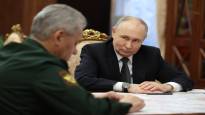The leaked budget documents shed an extraordinary light on the activities of the Kremlin’s propaganda apparatus.
Roni Kuronen,
Yrjö Kokkonen
A number of European media companies have published documents leaked from the Kremlin, which show the determined effort of the Russian leadership to control the information activities of both Russia and the territories it seized from Ukraine, the president Vladimir Putin to secure power.
The documents were obtained by the Estonian media house Delfi, and the information obtained by it is published by, among others, a Swedish company ExpressenGerman Der Spiegel and Austrian Der Standard.
The Kremlin’s propaganda plan is divided into three parts: ensuring the outcome of the presidential elections in March, targeting the people with an “information and ideological war†as well as converting the residents of the territories captured from Ukraine to be pro-Russian.
According to the documents, the operation was directed directly from the presidential administration, which received state money totaling more than 1.1 billion euros.
Ideological war
In Russia’s 2024 budget, most of the funds budgeted for state propaganda will be spent on ideological war, according to leaked documents. Almost 630 million euros have been granted for this purpose.
Propaganda is produced on numerous levels. To ensure citizens’ patriotic values, the Kremlin has produced numerous video games and phone applications, television series and movies. One of the pioneers of Putin’s personality cult was the TV series “GDR†that started in February, in which Putin’s famous spy hero has adventures.
Examining the documents reveals that Putin has been personally involved in the planning of the propaganda program. For several projects, future meetings with Putin or the president’s previous decisions are referred to in the budget negotiations.
Presidential elections
In the budget, 430 million euros have been allocated for influencing information related to the 2024 presidential election. The amount is significantly higher than the 62 million euros granted for organizing the elections themselves.
Apart from Putin, there are no other candidates to be taken seriously in the Russian presidential elections. Thus, most of the money used for the presidential elections has been used for propaganda, the purpose of which is to strengthen the people’s support for the Russian state and to justify the war of aggression started in Ukraine two years ago.
The ultimate message of the propaganda is that it is unpatriotic to vote against Putin.
Occupied Ukrainian territories
In the Russian budget, the working groups traveling in the occupied Ukrainian territories designated as “new territories” aim to replace the dish antennas of up to 80,000 households with Russian antennas.
Countering the Ukrainian media is one of the primary goals of the information war. It has been allocated 13 million euros per year in the budget.
According to the documents, Russia plans to establish numerous local news channels in the occupied Ukrainian territories. In addition, money has been allocated separately to the Luhansk information center and the Donetsk news agency. Both sites are full of Kremlin propaganda. According to Expressen, the websites have titles such as: “There is no better presidential candidate than Putin†or “Putin is one of the greatest leaders in the history of Russia†.
The leaked budget documents also reveal an eyebrow-raising detail. To the Russian Children’s Ombudsman For Marija Lvova-Belova 360,000 euros have been separately allocated for the removal of children – a special operation [Ukrainan] from the area. In the current budget, therefore, the war crimes that Belova and Putin are suspected of at the International Criminal Court (ICC) in The Hague are directly granted.
has done several stories about children kidnapped from Ukraine, the most recent of which you can read here.
In the budget, three million euros have been allocated for organizing pro-Russian events in Ukraine. In order to brainwash Ukrainian children, Putin has also established a center in the occupied territories that monitors youth studies, networks and youth culture. Almost 40 million euros have been granted for the operation of the institution in question.
